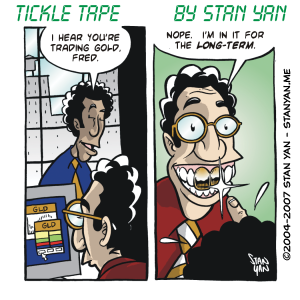Successful traders have learned how to make trades in a carefree, relaxed, and focused manner. They don’t put unnecessary pressure on themselves, stress themselves out, and then crack under the pressure. They don’t believe that they must succeed in any single trade; they keep their eye on the big picture. They don’t believe they need to be right. They don’t impose their will on the market. And they don’t try to predict the future behaviour of the market. Instead, they objectively observe market conditions, make a detailed plan of attack, and let the market take them where it wants them to go.
They stay calm and relaxed, and ready to anticipate what will happen next. Successful traders enter “the zone” as Mark Douglas and others have described this peak performance mental state. Seasoned traders do not doubt or second-guess themselves. They freely enter and exit trades without worrying about the consequences. This carefree approach to trading allows them to see trading opportunities more easily and allows them to take advantage of these opportunities when they arise.
Trading is a lot like playing sports. Players must stay objective, calm, and not crack under the strain of wanting to be “the best” or “perfect.” Over the weekend, college football fans observed what happens when a team seems to be playing “so perfectly” that some say they are “unbeatable.”
All season long, the Oklahoma Sooners have been winning and winning big. They were the only undefeated college football team, until Saturday night when they lost by over three touchdowns to the Kansas State Wildcats. What’s surprising about this loss is not that the Sooners lost, since even the best teams can lose occasionally. It was the way they lost and how they seemed to be defeated psychologically. After making their only touchdown in the early moments of the game, they seemed to be stunned and shaken for the rest of the game.
They couldn’t make even a single touchdown. It was unexpected and hard to believe. One commentator said it was like the bully who had never been beaten down. They knew how to win, but when upset and knocked down, they didn’t know how to get back up. Sooners’ Quarterback Jason White said, “They put pressure on us and got to us a few times.” And as the clock ticked away, Kansas State made another touchdown, then another, and then another. As one announcer put it in the final minutes of the game, “They just want to lick their wounds and go home.”
From a purely psychological perspective, one can wonder what would have happened had the Sooners lost one of their first few games. Maybe they would have learned how to recover from a setback, and when they were down by a couple of touchdowns, they could have easily come back to take the win. It’s like what some hedge fund managers say about good traders: “The best traders are those who have blown out their accounts a few times. They know what it feels like, know how to recover from it, and the possibility doesn’t haunt them anymore.”
Although it’s unpleasant to think about, it’s worth considering the worst-case scenario, and making a detailed plan to recover should it happen. It’s just one strategy for learning how to trade in a carefree manner so that should you face a severe financial setback, you can recover from it. Trading in the zone requires intense concentration and focus, and it’s difficult to maintain this stance when the pressure is on you to perform. Thus, you must do whatever you can to reduce the perceived psychological pressure. The most obvious way to relieve such pressure is to think in terms of probabilities and carefully manage risk.
It’s useful to remember that you may not win on any single trade, but after a series of trades, you will have enough winners to make a profit in the long run. It’s also important to manage your risk. Determine your risk up-front and risk only a small amount of trading capital on a single trade. Doing so will ease a lot of the pressure, allowing you to be more open to seeing the opportunities that the market offers. Don’t crack under the pressure of a potentially mortal financial defeat. Consider the possibility, and be ready to recover from it.


